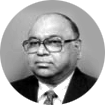Remembrance
 Professor (Dr.) V.S. Mani
Professor (Dr.) V.S. Mani
(6th March 1942-22nd August 2016)

It was in the month of May a decade ago when I walked in for an interview with respected Professor V.S. Mani in the Indian Society of International Law office in New Delhi, for securing admission into Gujarat National Law University (GNLU). GNLU had been established just two years prior to that as a national law school, with Professor Mani being at the helm of affairs as the institute’s first Director. Although I knew very little about law, what I did know was that I was going to be interviewed by one of the most internationally respectable legal academicians and a stalwart in international law. My interaction with Professor Mani lasted about fifteen minutes and during the course of the interaction, I could already see a mentor in him. As I finished my interview, excitement built up inside me for I was going to have the honour of being Professor Mani’s student. I enrolled in GNLU on 13th July 2006 in the meantime having avidly read Professor Mani’s profile on the internet.
Professor Mani as I noted was a former Professor of International Space Law in Jawaharlal Nehru University, New Delhi. He was also, simultaneously, in charge of the Jawaharlal Nehru Chair for International Environmental Law, and Director of the Human Rights Teaching and Research Programme. A Ph.D. from JNU, his doctoral thesis was on Procedure before International Tribunals. He had more than three decades years of teaching and research experience and had authored/edited nine books and over 100 research articles, some published in international journals and books, including one published in a book on Essays in International Law published by the United Nations Office of the Legal Affairs. In 2003, he was elected Executive President of the Indian Society of International Law, New Delhi.
Professor Mani in addition to his teaching experience, had practical experience as well. He was Legal Advisor to the Government of the Republic of Nauru in 1981-83 and again in 1985-90. He was directly involved in organising Nauru's victorious case against Australia before the International Court of Justice (1986-93). He was a member of the victorious Indian legal team to the ICJ led by India's then Attorney-General, Mr. Soli Sorabji, in the Atlantique case (Pakistan v. India) in 1999-2000. He was involved in the drafting of pleadings in at least four cases before the ICJ. While in Nauru, he also conducted foreign litigation and arbitrations in the US West Coast, Western Samoa, Australia and UK, and drafted legislation and legal documents. For a time, he functioned as Director of Public Prosecutions and also appeared before the Supreme Court of Nauru on behalf of the government in both civil and criminal cases.
Professor Mani was a Visiting Professor in the Faculty of Law and Politics, Tokyo University (2000) and the West Bengal National University of Juridical Sciences, Kolkata (2001) and Visiting Fellow at the Max Planck Institute for Comparative Public Law and International Law, Heidelberg, Germany (2003). He delivered the prestigious professorial lectures at The Hague Academy of International Law, The Hague, Netherlands in August 2005 with only former ICJ Judge Dr. Nagendra Singh, Professor R. P. Anand and Professor Upendra Baxi from India, having had this honour.
I saw a father figure in Professor Mani whose doors were always open to students. I clearly recall my meeting with Professor Mani, which lasted a good twenty minutes where he guided me on in a very structured manner on how to write articles. I remember him telling me that in this day and age, we were very lucky to have computers since during his time he had to keep re-writing the drafts of his articles. I will never forget the extremely kind gesture shown by Professor Mani when I got an electric shock one night, and he came the first thing in the morning to my hostel room to personally check on how I was feeling. Professor Mani was one of the first people with whom I discussed my idea of starting India Law Journal (ILJ). Not only did Professor Mani give me advice on how to conceptualize ILJ, it was also a privilege for me to have him as one of the Founder Advisors on the Board of Editors of ILJ. During Professor Mani’s term as Director of GNLU, he took only one lecture on international law for my batch. However I had the fortune of interacting with him not only in law school on a regular basis but even at times, to enjoy the warm hospitality of Professor Mani, his wife Vatsala ma’am and their younger son Krishna at their home.
I was sad when I learnt that Professor Mani was leaving GNLU but I continued to keep in touch with Professor Mani and his family and seeking his advice from time to time. Professor Mani thereafter became the Founder Director at the Seedling School of Law and Governance at Jaipur National University, a position he held till his unfortunate demise. On 22nd August, at around noon, I was informed through an SMS about the passing away of Professor Mani. I was shell-shocked for a moment and deeply saddened to hear this really tragic news. For the last decade, I had looked upto Professor Mani as a mentor and father-figure and had admired him for his simplicity, generosity and modesty. I will really miss Professor Mani and may God give his family the strength to bear this dear loss. May Professor Mani’s soul rest in peace.
- FIR Copy of Mahatma Gandhi assasination case
- Licito Concurso'20
- Rules for Licito Concurso '20- A National Legislative Drafting Competition
- Registration Form for Licito Concurso-20
- www.apexcourtweekly.substack.com
- www.lawupdater.com/wp/
- XIIIth K.K. Luthra Memorial Moot Court Competition 2017
- President of India Presented with the First Copy of the Book Statement of Indian Law Published by Thomson Reuters





